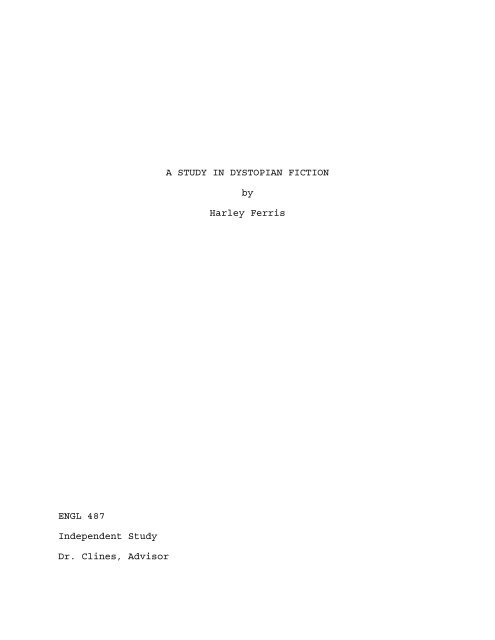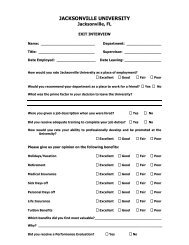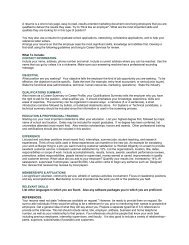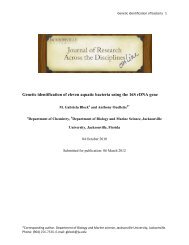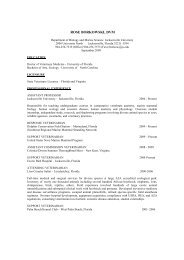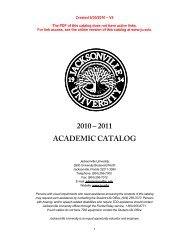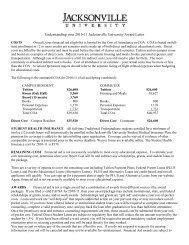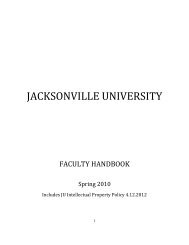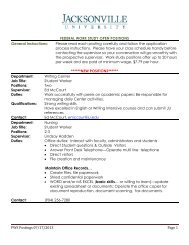A STUDY IN DYSTOPIAN FICTION by Harley Ferris ENGL 487 ...
A STUDY IN DYSTOPIAN FICTION by Harley Ferris ENGL 487 ...
A STUDY IN DYSTOPIAN FICTION by Harley Ferris ENGL 487 ...
Create successful ePaper yourself
Turn your PDF publications into a flip-book with our unique Google optimized e-Paper software.
A <strong>STUDY</strong> <strong>IN</strong> <strong>DYSTOPIAN</strong> <strong>FICTION</strong><br />
<strong>by</strong><br />
<strong>Harley</strong> <strong>Ferris</strong><br />
<strong>ENGL</strong> <strong>487</strong><br />
Independent Study<br />
Dr. Clines, Advisor
TABLE OF CONTENTS<br />
I. Introduction 1<br />
II. Definition 2<br />
III. Themes 4<br />
IV. External Dystopia 14<br />
V. Internal Dystopia 19<br />
VI. Conclusion 24<br />
Appendix A: Signs and Portents 27<br />
Appendix B: Works Studied 30
I. <strong>IN</strong>TRODUCTION<br />
Big Brother. Soma. Cyberspace. Words and ideas spawned<br />
from the texts of dystopian fiction have permeated modern<br />
culture, and in many ways, helped define it. A young man in a<br />
bowler hat with eye makeup, cane and cod-piece is a common<br />
fixture at Halloween parties, thanks to Stanley Kubrick and his<br />
film adaptation of Anthony Burgess’ “A Clockwork Orange.” Many<br />
are aware that paper burns at 451 degrees Fahrenheit, not<br />
because of science class, but instead owing to Ray Bradbury’s<br />
novel. While valuable for their storytelling and entertainment,<br />
the true significance of dystopian works lies in their ability<br />
to speak into one’s relationship to God, country, humankind and<br />
one’s own Self.<br />
It is evident that a major analysis could be done on any<br />
number of themes presented in dystopian literature. In truth,<br />
as several books have been written regarding only a single<br />
aspect of dystopia, this paper cannot provide a fully<br />
comprehensive study in the entire genre. Therefore, rather than<br />
providing summaries of each work and their respective impacts on<br />
both literature and culture, the collective body of works<br />
studied will contribute to a generalized explanation of themes<br />
and concepts present in most dystopian fiction, followed <strong>by</strong><br />
present-day parallels and a discussion of the significance of<br />
the genre and its ideas.
<strong>Ferris</strong> – Dystopia - 2<br />
II. DEF<strong>IN</strong>ITION<br />
The term “utopia” was coined circa 1516 <strong>by</strong> Thomas More.<br />
Literally meaning “no place”, it describes an island where<br />
everything is perfect. A “dystopia”, then, would be a negative<br />
utopia, a place in which everything is imperfect. There is some<br />
debate between the terms “dystopia” and “anti-utopia”.<br />
Generally, a dystopia does not pretend to be good, as in the<br />
case of “1984” and “Anthem”. An anti-utopia would, however,<br />
claim to be truly in the business of providing happiness for<br />
their citizens, as in the case of “The Giver” and “We”. For the<br />
purposes of this study, the term dystopia will be used to cover<br />
all works and themes presented and discussed.<br />
A dystopian society is ruled <strong>by</strong> group with a private agenda<br />
shrouded in euphemisms or outright lies. This group will use<br />
conditioning or coercion to maintain their rule, which often<br />
mirrors such real-world systems as communism, Apartheid, and the<br />
Roman Catholic Church. The controlling group regulates most<br />
aspects of the individual’s existence, everything from one’s<br />
daily routine to their family unit and career. The individual<br />
is not important as anything more than a part of the whole. As<br />
long as the status quo is maintained, the individual is<br />
typically safe, anonymous in the crowd.<br />
As conflict is necessary in storytelling, no dystopian work<br />
would be complete without dissention. It may be one person or a
<strong>Ferris</strong> – Dystopia - 3<br />
group, and there will often be an event in a main character’s<br />
experience that reveals the rift between the way things are and<br />
the way things might be better. Common devices for this event<br />
are missing a dose of emotion suppressants, seeing the hidden<br />
inner workings of the ruling system, or the discovery of<br />
forbidden elements from ages past. This awakening will give<br />
rise to a spirit of individualism, an awareness of human rights,<br />
and the knowledge that all is not as it seems and must be<br />
brought to light and, if possible corrected.<br />
As with much of literature, the ending may either be<br />
positive or negative; it is the journey that matters. The<br />
message of the work can often be more easily delivered if the<br />
hero suffers a tragic end at the hands of the society, and many<br />
of these works offer this feature. In this way, many dystopian<br />
works read as morality tales, aimed at pointing out flaws of the<br />
present and extrapolating them into the future. There is little<br />
left for readers to sort out; they know which side is right and<br />
which side is wrong. What is left to interpret is where to<br />
align the stereotypes in the contemporary societies and systems.<br />
In short, a dystopian fiction centers on a dissenting<br />
person or group in a supposed perfect society, awakened to<br />
inhumanity and willing to affect a change. Using this<br />
definition, the authors of these works have provided each human<br />
being with instructions for recognizing and overcoming such<br />
systems in their own life.
<strong>Ferris</strong> – Dystopia - 4<br />
III. THEMES<br />
There are five major themes that this paper will identify<br />
and review: pluralism versus individualism; chaos versus order;<br />
the precision of language; war versus peace; and humanity.<br />
Pluralism versus Individualism<br />
Much of early dystopian literature points to literal<br />
totalitarianism and communism seen on the rise <strong>by</strong> authors.<br />
Zamyatin and Rand both grew up in Russia watching Stalin take<br />
power, and as a result, “We” and “Anthem” have direct<br />
correlations to a collective form of government, taken to<br />
extremes for the purposes of satire and storytelling. Later<br />
works such as Orwell’s “1984” borrow heavily from these early<br />
novels, for while Stalin fell, many have continued to see the<br />
danger signs of collectivism and oligarchy creep into more<br />
recent politics. Certainly, Hitler used a similar approach with<br />
his Nazi propaganda to guide young minds, mirror in “1984” in<br />
the forms of the Youth League and Hate Week.<br />
The idea of collectivism is taken to extreme in these works<br />
through the education of the masses that they are not important<br />
as anything more than parts of the whole. They exist only to<br />
serve the State, and anything that benefits the State should<br />
benefit them, not the other way around. Needs are more or less<br />
provided in return for services to the State in the form of<br />
jobs, but careers are typically assigned and one does one’s work
<strong>Ferris</strong> – Dystopia - 5<br />
without question. Working hard is expected, but ambition for<br />
personal gain is squashed. Ambition must only be for the<br />
progress of the State.<br />
To reinforce the concept of parts of the whole, many works<br />
describe people as numbers, either <strong>by</strong> simply replacing the term<br />
“people” with “numbers”, or <strong>by</strong> actually making their name a<br />
number, in whole or in part.<br />
Of all these works, “Anthem” speaks against this more than<br />
the others. Rand removes singular pronouns from the language of<br />
the people, so Equality 7-2521 says “we” instead of “I”, “our”<br />
instead of “my”, and so forth. The story ends positively, as<br />
Equality and his lover escape from the society and live in the<br />
mountains, isolated from the State, starting their own society<br />
that will celebrate what they believe to be the most powerful<br />
word in the world: EGO.<br />
It is not simply enough, however, to suggest that each<br />
should run away from all forms of government or system and live<br />
independently. Rand begins with this as a matter of necessity,<br />
but as Equality describes his plans for raising a family, it is<br />
clear that he intends a new community built on interdependence,<br />
rather than independence. He suggests that man finds strength<br />
in numbers, but numbers must not be man’s only strength.<br />
In every dystopian work, the protagonist has at least one<br />
helper, if not an entire structure of people to provide a sort<br />
of underground rebellion. This proves the idea that people were
<strong>Ferris</strong> – Dystopia - 6<br />
not meant to function outside of community, while the theme of<br />
the work asserts that neither are people meant to simply be<br />
teeth in the gears of the machine.<br />
Chaos versus Order<br />
Seemingly all of these stories take place in what is to be<br />
the future, and the design of the community is commonly the<br />
same. Quite often, there is a theme of mathematics. Buildings<br />
are squared, streets are straight, life is regulated <strong>by</strong> a chart,<br />
and there is little room for the unexpected. “We” goes so far<br />
as to feature an equation for every situation so that a proper<br />
happiness coefficient may be derived. There is typically little<br />
color, people often wear matching clothes, and even hair (when<br />
it is not shaved) is typically the same.<br />
The purpose for this mass regulation is twofold. First, it<br />
contributes to the impression of sameness that is vital to<br />
collectivism. Second, it keeps choices out of the minds of<br />
individuals, leaving it instead to the State to decide what is<br />
best and when it is best for the citizens. This takes power<br />
from the people, which is exactly what must happen if the State<br />
is to maintain control. Much in the way a parent would make all<br />
decisions for a young child, that citizen, as a young child,<br />
would not have any control of the parent. Interestingly, the<br />
State often uses a familial name for the leader, such as Father,<br />
Big Brother, or Uncle.
<strong>Ferris</strong> – Dystopia - 7<br />
There is also commonly a great lack of nature. Animals are<br />
rare, if found at all, and even trees and plants are strange.<br />
In “We”, the character D-503 mentions his discomfort and<br />
uneasiness at walking upon the green, spongy, foreign earth.<br />
Quite often, the escape from the society means venturing out<br />
into nature, which is commonly described as wild and untamed <strong>by</strong><br />
the characters, though typically appears beautiful and serene to<br />
readers. Nature does not grown in squares, nor does it adhere<br />
to mathematical tables, therefore it cannot be controlled <strong>by</strong> the<br />
State. It also often produces feelings in people, aiding them<br />
in reflection and relaxation, for which there is no purpose in a<br />
dystopian setting.<br />
There are interesting parallels to this concept. It is<br />
common to see a child twirling a finger next to his ear to<br />
symbolize another being crazy or insane. This comes from the<br />
ancient idea that intelligence meant one thought in straight<br />
lines, while only the insane thought in circles. A humorous<br />
opposition to this idea is the ancient Oriental belief that evil<br />
spirits only traveled in straight lines, which explains the<br />
arched bridges and curved rooflines in Oriental architecture.<br />
That might certainly be argued as the case in many of these<br />
dystopian societies.<br />
Two prominent elements that fall into this category are<br />
religion and sex. Religion is very rarely seen in a dystopia as<br />
it relates to a deity. If there is a religion, it is more often
<strong>Ferris</strong> – Dystopia - 8<br />
a religion of the State, in which the leader of the State is<br />
worshiped, or even the very State itself. If one is to believe<br />
in a deity beyond the State, then one may claim to be bound to<br />
laws that are higher than the State. This provides an<br />
uncontrollable variable that the State must not allow, and as a<br />
result, there is no freedom of religion. Either there is a<br />
State religion, or no religion.<br />
The other reason there would be no need of religion in a<br />
dystopia is found in considering the purpose of religion. All<br />
religions are man-made systems intended to explain a reason for<br />
existence and a pattern for living. A thoroughly dystopian<br />
government will make it clear that the individual exists to<br />
serve the state. The government will also have regulated every<br />
aspect of a person’s life, so a pattern of living will also be<br />
clear. If a one understands why and how one exists, there is no<br />
need for religion.<br />
In the matter of sex, authors take different paths but<br />
arrive at the same place. Some societies promote rampant sexual<br />
activity, while others entirely repress it, often through<br />
medication. In either case, the end result is to squash the<br />
longing for any particular person. This would also present a<br />
variable that might cause an individual to follow a law of the<br />
heart, rather than a law of the State.<br />
It is also very rare for a couple (when there is coupling)<br />
to decide on their own to have a child. Children are typically
<strong>Ferris</strong> – Dystopia - 9<br />
born in a laboratory, or there are birth mothers that are merely<br />
ba<strong>by</strong>-makers; the resulting child does not have an emotional<br />
attachment to anyone. “Children of Men” presents a unique<br />
dynamic, in that mass sterility has plagued the planet. Despite<br />
the eliminated risk of pregnancy, sexual activity decreases.<br />
Author P.D. James suggests that part of the appeal of sex is<br />
that the couple is, at the very least, mimicking the ability to<br />
create life, and that is what contributes to its power.<br />
The Precision of Language<br />
From a linguistic standpoint, dystopian literature often<br />
provides an additional lens to view the story and its theme. In<br />
some works, most notably in “A Clockwork Orange”, the author<br />
sets up a new way of speech. Anthony Burgess is quite famous<br />
for his invention of “Nadsat”, the language spoken <strong>by</strong> the youth<br />
in his novel. Burgess observed the youth of his day taking<br />
slang and words from other countries, and imagined a setting<br />
where the language drew from Russian words, rhyming slang and<br />
references to Shakespeare and the King James Bible. In creating<br />
this unique dialect, he not only contributed to the future-tense<br />
setting of the novel, but also demonstrated through language the<br />
difference between the youth and adults. The device of firstperson<br />
narrative without providing a lexicon assumes the<br />
reader’s understanding of the language, which serves to build<br />
credibility in the young protagonist, Alex, until, <strong>by</strong> the end,
<strong>Ferris</strong> – Dystopia - 10<br />
his language is perfectly understandable to the reader. In the<br />
story, however, it draws a line between the two classes (youth<br />
and adult), limiting their ability to communicate with definite<br />
language.<br />
Another linguistic study could be made of “Newspeak” in<br />
Orwell’s “1984”. An entire section of The Party is devoted to<br />
revising the language in the name of efficiency, but the actual<br />
purpose is to remove definitive language from speech. By<br />
shrinking the language, making words apply in multiple<br />
situations, and the paradoxical definitions of terms such as<br />
“doublethink” (believing two contradictory thoughts to be<br />
simultaneously true), it becomes impossible to be truly clear<br />
about anything.<br />
“The Giver” presents an opposite side of that coin, in<br />
which the precision of language is essential to good<br />
communication in the society. The character Jonas is introduced<br />
pondering the correct word to define his feelings, finally<br />
settling not on “nervous” as he initially thought, but<br />
“apprehensive”. Lois Lowry keeps this theme at the forefront,<br />
turning it around when Jonas discovers the concept of love and<br />
asks his parents if they love him. They are unable to respond<br />
and chastise him for using such antiquated and ambiguous<br />
language. The concept of love is simply too intangible and the<br />
dystopia is not set up to measure it.
<strong>Ferris</strong> – Dystopia - 11<br />
In “Anthem”, the character Liberty expresses frustration at<br />
her inability to convey her feelings to Equality, due to the<br />
lack of singular pronouns.<br />
Today, the Golden One stopped suddenly<br />
and said:<br />
"We love you."<br />
But they frowned and shook their head<br />
and looked at us helplessly.<br />
"No," they whispered, "that is not what<br />
we wished to say."<br />
They were silent, then they spoke<br />
slowly, and their words were halting, like<br />
the words of a child learning to speak for<br />
the first time:<br />
"We are one . . . alone . . . and only<br />
. . . and we love you who are one . . .<br />
alone . . . and only."<br />
We looked into each other's eyes and we<br />
knew that the breath of a miracle had<br />
touched us, and fled, and left us groping<br />
vainly.<br />
This frustration is echoed in many of the dystopian works<br />
as the characters struggle to make sense of their emotions and<br />
ideas in a society that worked to scratch out all avenues of<br />
personal expression. Language is vital to communication, and<br />
the less capable a human is to communicate, the less communion<br />
and intimacy one can experience with another, leaving the State<br />
as the only true object of affection in the person’s life.<br />
War versus Peace<br />
In these stories, the situation of war or peace is<br />
typically a concern, but it makes little difference which is a
<strong>Ferris</strong> – Dystopia - 12<br />
part of the State. That it is maintained is the only important<br />
function. “1984” features an ever-changing enemy, because the<br />
war must not end. The government in “Equilibrium” maintains its<br />
control because the peace must not end. In this sense, the<br />
Orwellian “Ingsoc” principle holds true: war is peace. War<br />
equals peace and peace equals war when the approach is the same.<br />
Plato, in describing the ideal republic, portrays a people that<br />
are generally pacifist in nature, but will fight if necessary.<br />
In these dystopian communities, citizens are either fully<br />
pacifist and unable to fight, or fully capable and expecting to<br />
always fight. The motive behind both cases is the perpetuation<br />
of fear, which keeps the citizen looking to the leader to<br />
determine what is best for the community.<br />
Humanity<br />
The most obvious indicator of a dystopian government’s<br />
imperfect nature is their approach and attitude toward humanity.<br />
The repression of the “free radicals” of the human mind and<br />
heart, such as love, spiritual awakening and discovery,<br />
creativity and invention keeps a person focused on their tasks,<br />
allowing no time or space to think, consider, reflect or ponder.<br />
One’s motivation is not for themselves, but only for the State<br />
they are conditioned to love.<br />
When it comes to needs and desires, there is a similar<br />
approach taken to the War versus Peace idea: either all or
<strong>Ferris</strong> – Dystopia - 13<br />
nothing. Again, the particular side does not matter, as long as<br />
it is complete. Physical needs may be entirely met, as in<br />
“Brave New World”, or constantly short in supply, as in “1984”,<br />
but in both cases, the individual’s focus remains on those<br />
needs. Evolutionary theory indicates that creatures turn their<br />
focuses to higher matters when basic needs are met, so in the<br />
case of the former, there must be a mechanism in place to make<br />
the devices that meet needs more and more impressive, so<br />
technological advancements are applied to these industries.<br />
Regardless, the aim of the government must be to keep the people<br />
busy, either through structure, abundant pleasure, or constant<br />
want.<br />
Instincts, particularly sexual ones, are often repressed <strong>by</strong><br />
medication. Rights are limited and privacy is minimal. The<br />
nature versus nurture idea is put to the test as the government<br />
creates an individual’s reality from birth, controlling<br />
everything through nurture, creating a perfectly predictable<br />
human being.<br />
Zamyatin, in keeping with the satire of “We”, creates a<br />
situation where the government praises the machines and robots<br />
as perfect, distinguishable only from humans <strong>by</strong> one thing:<br />
imagination. As an effort to achieve perfection, doctors have<br />
found the location of imagination in the brain and all are<br />
invited to “hurry to the auditorium where the Great Operation is<br />
being performed.”
<strong>Ferris</strong> – Dystopia - 14<br />
IV. EXTERNAL DYSTOPIA<br />
If a dystopia is defined as a society ruled <strong>by</strong> an<br />
authoritative power that presents itself as beneficial while<br />
masking a negative agenda, there are certainly many parallels<br />
worth exploring, whether in governments, religions, or<br />
organizations.<br />
Concern of the loss of personal freedom in America is at an<br />
all-time high. It must also be observed that flexibility and<br />
freedom should not be confused. Easy access to information on<br />
the Internet concerns flexibility, while the limits on such<br />
information concerns freedom. Internet service providers are<br />
regulated <strong>by</strong> the FCC, a government organization. As email<br />
became ubiquitous and drove down patronage of the US Postal<br />
Service, the government began discussing possible ways to<br />
regulate email. Journalists have enjoyed certain privileges<br />
under the First Amendment which are not being fully extended to<br />
online journalists, as in the case of Josh Wolf, who was<br />
imprisoned for not giving a videotape to the FBI. They asserted<br />
he was not a true journalist and therefore not protected <strong>by</strong> the<br />
Rights of Press. The case was eventually dropped, but not<br />
before Wolf spent over 200 days in prison.<br />
The terror events in New York on September 11, 2001, led to<br />
the US government imposing unprecedented levels of<br />
constitutional infringements, both in legislation passed and
<strong>Ferris</strong> – Dystopia - 15<br />
personal actions on the part of the President. As hotly as<br />
these issues have been debated, George W. Bush is not the first<br />
president to pull back constitutional freedom in US history.<br />
Restrictions and regulations have been imposed on everything<br />
from alcohol consumption to property rights to personal privacy<br />
in the last century. A simple thing like a seatbelt law might<br />
be argued as a benefit for car passengers, but if one considers<br />
the difference in automobile deaths now compared to the 1960s,<br />
it is clear there is a staggering shift: more people die now in<br />
car crashes. The most compelling reason is the rise in the<br />
speed limit, which is regulated <strong>by</strong> the government. Looking at<br />
the larger picture, a seatbelt law might be construed as a way<br />
to shift the eyes of responsibility from the government to the<br />
citizen. While the US may not have entered the realm of<br />
dystopia as defined above, it does seem be eyeing the gates.<br />
Moving beyond the political realm, one can find dystopian<br />
elements throughout culture, complete with conditioning and<br />
coercion. An obvious example would be gangs. Few need an<br />
explanation of the incongruence between talk of “family” in a<br />
gang and the internal violence. One is accepted only as long as<br />
one is acquiescent. If a gang member were to disagree, he or<br />
she is often beaten or killed.<br />
Corruption and negative stereotypes have surround labor<br />
unions since their inception. Various unions have made<br />
headlines for controlling their members through force, removing
<strong>Ferris</strong> – Dystopia - 16<br />
individuals’ choices and freedoms and even racking up attempted<br />
murder charges against their own.<br />
A subtler way one might observe a dystopian influence in<br />
modern culture would be in biased presentation <strong>by</strong> organizations<br />
that are expected to be trustworthy. Besides the government,<br />
this would include leaders in all industries, such as<br />
pharmaceuticals, food production and public utilities. Scandal<br />
from all of these groups is not uncommon, and in many ways<br />
expected. Public outrage may still be present, but surprise is<br />
decreasing as more and more leading corporations fall.<br />
Consumers base their decisions from statements created and paid<br />
for <strong>by</strong> these corporations, delivered through advertising<br />
agencies whose prime allegiance is not to the consumer but to<br />
their own profits. A trip through the grocery store provides<br />
clear evidence of this. A bottle of juice, marketed for<br />
children, displays “Natural Flavors” yet contains 0% juice.<br />
Parents see the word “natural” and believe it healthier than<br />
soda. Many of the key words used on food packaging fall into<br />
this category, presenting consumers with a false sense of faith<br />
in their product as healthier or more appealing, while it may or<br />
may not be true. Clever wording is the specialty of the<br />
advertising agency, and it does not stop with mottos and<br />
slogans.<br />
Advertising agencies employ another practice that perks the<br />
concern of conspiracy watchdogs: behavior-based communications.
<strong>Ferris</strong> – Dystopia - 17<br />
Many retailers now offer a card that tracks purchases and<br />
spending habits. The user receives coupons from time to time<br />
based on the spending tracked with that card. Initially, this<br />
appears to be a pleasant convenience, but some could feel<br />
nervous about this sort of tracking. In a similar way, search<br />
engines such as Google keep track of every search made in their<br />
application, for the purposes of improving results. As the<br />
results are displayed, however, relevant advertisements appear<br />
in the margins of the page. This has been brought into their<br />
email service, Gmail. The advertisements are based on the<br />
actual content of the emails themselves. While Google asserts<br />
that no one is specifically reading the email to find<br />
appropriate advertising, the work instead being done <strong>by</strong> a<br />
computer, it shows how simple it would be to take the next step<br />
and monitor a person’s activities. As online activities<br />
increase in width and depth, email is more frequently used for<br />
receipts from purchases, utility bill statements and payments,<br />
job searches, real estate hunts, companionship services like<br />
Match.com and eHarmony, in addition to personal correspondence.<br />
Yet another example would be the media, which, according to<br />
surveys, people generally distrust. Ratings, however, combined<br />
with an increase in dedicated news programs and even dedicated<br />
news networks, indicate otherwise.<br />
One of the most famous organizations that has been worked<br />
into dystopian literature is the Roman Catholic Church. The
<strong>Ferris</strong> – Dystopia - 18<br />
Protestant Reformation brought to light centuries of the<br />
controlling nature of the Church through fear and the guarding<br />
of the Bible. Priests alone read the Scriptures; priests alone<br />
interpreted the Scriptures. Interaction with God was mediated<br />
<strong>by</strong> the Church. It was a sin to question the Church or its<br />
decisions. The portrayal of the Great Benefactor in Zamyatin’s<br />
“We” bears a remarkable likeness to the early Catholic Church,<br />
and Zamyatin himself confirmed this parallel.<br />
A documentary from 2007 about Scientology made<br />
international news, resulting in a flurry of interest over the<br />
practices and nature of that faith. Both professional and<br />
amateur videos available on the Internet portray similar fear<br />
and manipulation tactics on the part of church leaders and<br />
members, and former church members report the same things. A<br />
smaller, though deadlier, version of this would be cult groups<br />
like Jonestown and the Branch Davidians, where the truth was<br />
skewed and individuals were controlled <strong>by</strong> power-hungry leaders<br />
with their own agendas.<br />
Whether manifested in an imposing government, a bullying<br />
union boss, a misrepresenting corporation or an overbearing<br />
family member, literal and metaphorical parallels to dystopian<br />
societies are everywhere.
<strong>Ferris</strong> – Dystopia - 19<br />
V. <strong>IN</strong>TERNAL DYSTOPIA<br />
The most dangerous form of dystopia is the kind the one<br />
sets up in one’s own mind. An internal system motivated <strong>by</strong><br />
fear, misinformation, manipulation and isolation will cripple a<br />
society from within even more effectively than through political<br />
means. While a political or military structure may impose an<br />
oligarchy, there will always be dissent, even if just the quiet<br />
belief that the system is wrong. What makes the dystopia<br />
complete, however, is the collective agreement from citizens<br />
that things are as they should be. If this internal conclusion<br />
is made, even without a totally corrupt ruling power, it is, in<br />
some ways, as if that power is already in place.<br />
At one end of the spectrum, a dystopia would preach the<br />
value of full collectivism, where any life is only for the<br />
purpose of serving the State. At the other end, there is the<br />
rugged individualism modeled <strong>by</strong> Equality (turned Prometheus) in<br />
Rand’s “Anthem”, where he literally finds a shack in the woods,<br />
completely departed from all society but his own.<br />
It is important to observe that not a single protagonist in<br />
these stories succeeds without the help of at least one other<br />
individual. This eliminates the argument for pure isolationism,<br />
yet the authors of these works clearly convey the danger of pure<br />
pluralism. The middle ground is interdependence. Humans must
<strong>Ferris</strong> – Dystopia - 20<br />
depend on each other to survive, yet no single person or unit<br />
must be so important that, if removed, the society would<br />
crumble.<br />
There are many situations of internal dystopia, each<br />
corresponding to elements of the fictional ruling powers in<br />
these works. The largest motivating component in this<br />
literature is fear, typically from isolation, change and<br />
punishment. These are the three prime motivators in selfimposed<br />
dystopian behaviors that hold people back from<br />
experience life in fuller ways.<br />
There is great comfort for many people to know that they<br />
are not alone. There are plenty of documented cases of<br />
psychoses and neuroses that stem from isolation. Infants that<br />
are ignored, even if nourished, do not thrive as those who are<br />
coddled and shown affection. Sensory deprivation is proven to<br />
cause severe mental and emotional trauma. Humans are not wired<br />
to exist in a vacuum. Yet there is a danger in over-identifying<br />
with a group to such an extent that one loses their own selves,<br />
their own identity, and they become little more than part of the<br />
crowd. While their own identity slips farther away, the<br />
identity of the group takes over, until that person does not<br />
have any identity other than as part of the group. It may be a<br />
group of coworkers, a spouse or significant other, a school or a<br />
church. If the group is taken away, or even if the dynamic
<strong>Ferris</strong> – Dystopia - 21<br />
changes, the person feels out of place, lost, confused, or<br />
disenfranchised.<br />
A common occurrence of this is when a group changes a<br />
leader, such as a new pastor in a church, a new boss at work, or<br />
even a couple that breaks up. A person with a healthy sense of<br />
identity adjusts to fit the new dynamic and paradigm. One who<br />
has lost their sense of identity to the group has nothing they<br />
can adjust. The group itself has changed, and as that<br />
particular group identity is gone, there are no longer the<br />
defining elements that allowed that person to feel “themselves”.<br />
They will either stay or leave, but in either case, they do not<br />
adjust; they merely trade the outdated group identity for the<br />
current one. This idea is clearly shown in “1984” when Oceania<br />
changes enemies from East Asia to Eurasia in the middle of a<br />
hate speech. The speaker receives the news in his ear and<br />
continues his tirade against the enemy, only changing the name.<br />
Volunteers quickly run and replace the hate posters to match the<br />
new truth, and the crowd barely registers the change.<br />
Codependence in families is a common example of the fear of<br />
punishment. One member of the family may control all the others<br />
<strong>by</strong> coercion and manipulation, resorting to guilt tactics when<br />
confronted. The family learns to play within a certain set of<br />
rules that prevents any of them from experiencing greater levels<br />
of communication and intimacy.
<strong>Ferris</strong> – Dystopia - 22<br />
In sometimes less tangible forms of punishment, fear can<br />
creep into the mind of anyone seeking to better themselves,<br />
simply because it contains the unknown. One might be afraid to<br />
fail because they fear the punishment of ridicule. Another<br />
might be afraid to succeed because they fear the punishment of<br />
envy or mutiny. Many have experienced well-meaning friends and<br />
loved ones who will politely caution against setting hopes too<br />
high, yet turn around and chastise for not being proactive.<br />
Finally, an important element for any dystopia to be<br />
effective is the management and manipulation of truth. Possibly<br />
the most common way individuals keep themselves chained is <strong>by</strong><br />
ignoring their own ignorance. It is much easier to close one’s<br />
eyes to environmental, political and humanitarian concerns<br />
around the world, because one fears that learning of these<br />
issues will lead to an uncomfortable lifestyle change. It is<br />
easier to say, “I don’t want to know,” rather than be willing to<br />
let new evidence inform future decisions. This keeps people<br />
rooted to a false, self-constructed paradigm that becomes<br />
farther from reality as time passes. In “Anthem”, the society<br />
lives without electricity. It is not clear how this was lost,<br />
but when Equality discovers electrical power and how to harness<br />
it, he is rebuked for assuming to know more than the Scholars.<br />
If this one idea can be overcome, the idea that truth is<br />
not something to be feared but something to be embraced, then
<strong>Ferris</strong> – Dystopia - 23<br />
all other fears can be overcome and individuals can grow and<br />
evolve, their only constraint being the pace of their search for<br />
truth. Combined with a healthy community built on<br />
interdependence, the search for truth will ultimately result in<br />
the powerful discovery of meaning and significance. To fully<br />
experience the joys and wonder of humanity, humans must take<br />
responsibility for their actions, keep their eyes and minds open<br />
to greater understanding and deeper knowledge, value the life<br />
around them, and embrace themselves as members of existence.
<strong>Ferris</strong> – Dystopia - 24<br />
VI. CONCLUSION<br />
The protagonists in dystopian stories often share a common<br />
tale. They learn that there is more to experience than their<br />
government will allow; they feel a previously-repressed need or<br />
desire grow from within; they ultimately determine that life as<br />
they know it is not really life as it should be. What sets them<br />
apart from the countless others is their decision to question,<br />
their willingness to challenge presumptions, their thirst for<br />
knowledge and experience, and courage to risk their comfort to<br />
make life better. While these are all admirable qualities in<br />
the opinion of most, it requires stepping out of a comfort zone<br />
and being willing to hurt for the cause. The reason these<br />
protagonists are truly heroes is that they are not, in general,<br />
merely doing this for their own good, but for the good of the<br />
entire human race. It becomes irrelevant in the story whether<br />
the person lives or dies in the process. The determinant of<br />
their success is whether or not they improved the situation for<br />
those to follow.<br />
Turning to present day reality, these heroes are typically<br />
known as activists. Martin Luther King, Jr., Stephen Biko,<br />
Mahatma Ghandi, and Malcolm X all died for their voice, but each<br />
of them, and many others, would have accepted their death as<br />
part of the path to greater freedom for individuals. This is a
<strong>Ferris</strong> – Dystopia - 25<br />
very public version of the decision to overcome individual and<br />
political dystopias.<br />
A dystopia becomes successful when it finally removes the<br />
individuality from the individual; the humanity from the human.<br />
Only when people become numbers, not “one” but “one of”, can a<br />
ruling power truly take over. There have been and always will<br />
be unfair and corrupt governments and systems, but what makes<br />
one of these truly dystopic is the acceptance from the masses<br />
that agree, “This is right.”<br />
Just as an oligarchy can strip power from individuals,<br />
individuals can relinquish their own selves through internal<br />
constructs that equal nothing short of a dystopia.<br />
Manipulation, misinformation, ignorance and fear need not always<br />
come from the outside. Indeed, when originating from one’s own<br />
mind, the effects can be much more persuasive and the damage<br />
much more lasting.<br />
As the heroes of dystopian literature struggled and fought<br />
to overcome the external sources of control, so each individual<br />
must look inside themselves to find those things that bind them<br />
to fear, slavery, war and ignorance. As the mindless blindly<br />
shuffle along in uniformity in so many of these classic texts,<br />
there is a part of each human that is blind to the limits they<br />
have themselves allowed to be placed on their lives. Once aware<br />
of these limits, they have the same choice as D-503, Winston
<strong>Ferris</strong> – Dystopia - 26<br />
Smith or Bernard Marx: to go with the flow or swim upstream.<br />
The choice to fight the system is never without sacrifice, and<br />
one may not overcome deep-seeded roots of fear and ignorance in<br />
their own minds without a great deal of struggle. But the end<br />
result, as each dystopian hero believes and hopes to reach, is<br />
freedom.
<strong>Ferris</strong> – Dystopia - 27<br />
APPENDIX A: SIGNS & PORTENTS<br />
Following is a list of items from popular dystopian works<br />
that find correspondence in our society today. These may not<br />
necessarily lead to a dystopian society, but are simply<br />
presented as possible hints of things to come.<br />
Big Brother is watching you. “1984”<br />
- Chicago has begun implementing digital surveillance systems<br />
all throughout the city to monitor various activities.<br />
Cameras are fitted with microphones that can react to sounds<br />
like gunshots, swiveling quickly to catch as much action as<br />
possible. Speeding tickets are also issued through camera<br />
surveillance.<br />
Houses are made of glass to remove privacy. “We”<br />
- Under the Patriot Act, the government may perform various<br />
invasions of privacy if they suspect one of ties to a<br />
terrorist organization.<br />
The owls died out first. “Do Androids Dream of Electric Sheep?”<br />
- All around the world, millions of bees are dying. This has<br />
created a serious concern for many who understand the role<br />
bees play in pollination and agriculture. Bleakest estimates
<strong>Ferris</strong> – Dystopia - 28<br />
show that without a turnaround in bee population, humans may<br />
be required to begin seeking alternative food sources in as<br />
little as ten years.<br />
The enemy does not matter, as long as there is one. “1984”<br />
- Everything is a war: the war on terror, the war on drugs, the<br />
war on cancer, the war on communism, the war on illiteracy,<br />
etc. Keeping the language of war conjures a certain set of<br />
reactions and systems of dealing with problems, creating a<br />
“with us or against us” mentality, leaving less room for<br />
creative problem-solving.<br />
Foreign workers are abused and abandoned. “Children of Men”<br />
- Public awareness and concern is reaching an unprecedented<br />
high in the United States regarding foreign workers and<br />
illegal immigrants. Stories of abuse and unfair practices<br />
are common.<br />
Everyone embraced The Sameness. “The Giver”<br />
- Youth sports leagues have removed winning and losing from the<br />
game, to avoid hurt feelings in children. Names for ethnic<br />
groups have changed several times over the years to be more<br />
sensitive and politically correct, leaving people unsure what<br />
to call their neighbors. Due to globalization, younger
<strong>Ferris</strong> – Dystopia - 29<br />
adults are leaving poorer countries in droves in search of a<br />
better life, and in doing so, adopt the culture of their new<br />
home, losing ties with their own heritage. Sometimes a<br />
single generation later, they are not able to speak their<br />
native language.<br />
Narcotics are mass-distributed. “Brave New World”<br />
- Pharmaceutical companies have never sold more emotion-related<br />
drugs than at present. Whether for social anxiety,<br />
depression, insomnia or hyperactivity, both children and<br />
adults are more heavily-medicated now than people of any<br />
other time.
<strong>Ferris</strong> – Dystopia - 30<br />
APPENDIX B: WORKS STUDIED<br />
Novels<br />
- 1984 - George Orwell<br />
- Anthem - Ayn Rand<br />
- Brave New World - Aldous Huxley<br />
- Children of Men - P.D. James<br />
- A Clockwork Orange - Anthony Burgess<br />
- Do Androids Dream of Electric Sheep? - Philip K. Dick<br />
- Fahrenheit 451 - Ray Bradbury<br />
- Farnham’s Freehold – Robert A. Heinlein<br />
- The Giver - Lois Lowry<br />
- Logan’s Run - William F. Nolan and George Clayton Johnson<br />
- Neuromancer - William Gibson<br />
- We - Yevgeny Zamyatin<br />
Films<br />
- Æon Flux (2005)<br />
- Bladerunner (1982)<br />
- Brave New World (1998)<br />
- Brazil (1985)<br />
- Children of Men (2006)<br />
- Dark City (1998)<br />
- Equilibrium (2002)
<strong>Ferris</strong> – Dystopia - 31<br />
- Fahrenheit 451 (1966)<br />
- Gattaca (1997)<br />
- Idiocracy (2006)<br />
- The Island (2005)<br />
- Minority Report (2002)<br />
- Planet of the Apes (1968) (2001)<br />
- THX 1138 (1971)<br />
- V for Vendetta (2005)<br />
Non-Fiction<br />
- The Dystopian Impulse in Modern Literature - M. Keith Booker<br />
(1994)<br />
- No Place Else: Explorations in Utopian and Dystopian Fiction<br />
- Edited <strong>by</strong> Rabkin, Greenberg and Olander (1983)


